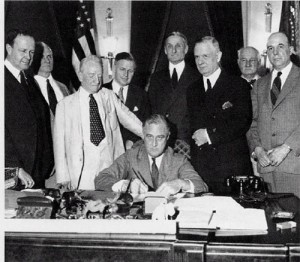The Securities Act of 1933 is referred to as the “truth in securities” law and has two basic  objectives:
objectives:
- Requires that investors receive financial and other significant information concerning securities being offered for public sale;
- Prohibit deceit, misrepresentations, and other fraud in the sale of securities.
To achieve these goals, securities must be registered before they can be sold to the public. The registration process requires that issuers provide potential investors with essential facts about the investment, including:
- A description of the company’s properties and business;
- A description of the security to be offered for sale;
- Information about the management of the company;
- Financial statements certified by independent accountants
With such information investors, not the government, can make informed judgments about whether to purchase the securities. While the SEC requires that the information provided be accurate, it does not guarantee it.
Not all securities, however, must be registered before they can be sold to the public. These include:
- Certain exempt securities (such as US government securities, municipal securities, short-term corporate debt, and commercial bank securities)
- Securities that are sold in an exempt transaction (such as those sold in a private placement (Reg D), offerings of limited size (Reg A), and intrastate offerings (Rule 147)
Knopman Notes:
Remember the basic provision of the Act of 1933 – all securities must be registered to be lawfully sold to the public unless:
- The security is exempt;
- The transaction is exempt.
This framework will help guide candidates through the analysis of whether a security must be registered. From here, candidates can recall and analyze the lists of exempt securities and transactions to make such a determination. And remember, if either the security or transaction is exempt it means the SECURITY can lawfully sold without be registered.
Exams:
Series 7, Series 24, Series 63, Series 65, Series 66, Series 79




5 comments On The Securities Act of 1933
Thanks for finally writing about >The Securities Act of 1933 – Knopman Marks Financial Training <Liked it!
Thanks for every other magnificent article. Where else could anybody get that type of information in such an ideal method of writing?
I’ve a presentation next week, and I am at the search
for such information.
I seldom leave a response, however i did some searching and
wound up here The Securities Act of 1933 – Knopman Marks Financial Training.
And I actually do have a couple of questions for you
if you usually do not mind. Is it only me or does it
give the impression like a few of these responses come across like
they are written by brain dead people? 😛 And, if you are writing at additional online sites,
I would like to follow anything fresh you have to post.
Would you make a list of all of all your social sites like your Facebook page, twitter feed,
or linkedin profile?
This design is spectacular! You most certainly know how to keep a reader amused.
Between your wit and your videos, I was almost moved to start my own blog (well, almost…HaHa!) Great job.
I really loved what you had to say, and more than that, how you presented it.
Too cool!
Hiya very nice site!! Guy .. Excellent ..
Amazing .. I’ll bookmark your site and take the feeds also?
I’m glad to search out so many helpful info here within the put up, we need work out
extra techniques on this regard, thank you for sharing.
. . . . .
Comments are closed.